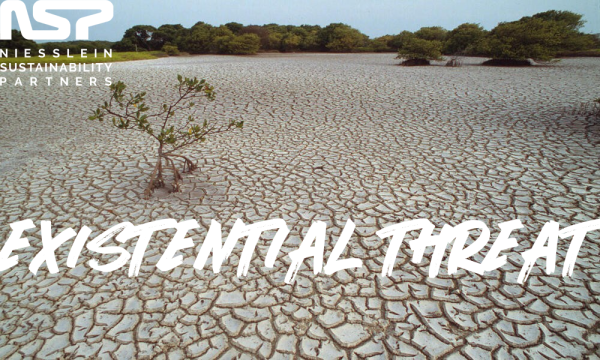The Existential Threats to Climate Response: Risks, Causes, Responses, and Business Implications
Introduction
The global endeavour to mitigate climate change is encountering formidable challenges, particularly in light of political actions that undermine environmental policies and scientific discourse. The resurgence of such political dynamics poses existential threats to climate response initiatives. This discourse examines the associated risks, underlying causes, potential responses—including systems change approaches—and probable outcomes for businesses operating on an international scale.
Risks
Recent political developments have precipitated the dismantling of critical environmental protections. For instance, the elimination of the Justice40 initiative, which aimed to allocate 40% of environmental programme benefits to communities burdened by pollution, signifies a substantial regression in environmental justice efforts. This rollback not only exacerbates environmental degradation but also disproportionately affects marginalised populations. Moreover, the deliberate omission of climate change references from federal communications, exemplified by the rebranding of the Federal Emergency Management Agency's "climate resilience" section to "future conditions," reflects a broader trend of suppressing scientific information. Such obfuscation hampers public awareness and impedes informed policy-making, thereby undermining the foundation of effective climate action. Additionally, executive actions aimed at promoting fossil fuel projects have inadvertently jeopardised funding for essential infrastructure initiatives. For example, an order intended to prioritise fossil fuels has disrupted funding for various non-green infrastructure projects, creating confusion and potential delays in critical developments.
Causes
The politicisation of environmental issues has led to the marginalisation of scientific input in policy-making. This entanglement fosters an environment where empirical evidence is disregarded in favour of political expediency, thereby compromising the integrity of environmental governance. Furthermore, the weaponisation of cancel culture, characterised by the suppression of dissenting views rather than engaging in constructive dialogue, has been utilised to advance specific agendas. This approach stifles open discourse, leading to the entrenchment of polarised perspectives and hindering collaborative problem-solving essential for effective climate response. Additionally, policies favouring fossil fuel industries over renewable energy initiatives reflect a prioritisation of short-term economic gains. This emphasis on traditional energy sectors undermines investments in sustainable alternatives, perpetuating reliance on environmentally detrimental practices.
Responses
- Addressing these multifaceted challenges necessitates a systems change approach, which involves transformative strategies targeting the root causes of systemic issues. This approach encompasses several key strategies:
- Advocacy for Science-Based Policies: Engaging in robust advocacy for the integration of scientific research into policy decisions is crucial. This involves supporting organisations and leaders who prioritise evidence-based approaches to environmental governance, ensuring that policies are informed by credible scientific data.
- Promotion of Transparent and Inclusive Dialogue: Fostering open discussions that include diverse perspectives can counteract the divisive effects of cancel culture. Encouraging respectful discourse allows for the exchange of ideas, leading to more comprehensive and effective climate strategies.
- Corporate Commitment to Sustainability: Businesses can play a pivotal role by integrating sustainability into their core operations. This includes adopting renewable energy sources, reducing carbon footprints, and transparently reporting environmental impacts, thereby contributing to global climate efforts and setting industry standards.
- Implementation of Nature-Based Solutions: Embracing nature-based solutions, such as reforestation and wetland restoration, can enhance ecosystem resilience and sequester carbon effectively. These strategies not only mitigate climate change but also provide co-benefits like biodiversity conservation and improved water quality.
- Development of Resilient Infrastructure: Investing in infrastructure that can withstand climate-related disruptions is essential. This includes designing urban areas with green spaces and permeable surfaces to manage flood risks, as exemplified by the "sponge city" concept implemented in various regions.
Likely Outcomes for Global Businesses
- The integration of systems change approaches into climate response strategies has significant implications for businesses operating globally:
- Regulatory Uncertainty: Frequent policy reversals create an unpredictable regulatory environment, complicating long-term planning for businesses. Companies may face challenges in compliance and investment decisions due to shifting environmental regulations.
- Reputational Risks: Associations with environmentally harmful practices can lead to public backlash, affecting brand reputation and consumer trust. Businesses perceived as neglecting environmental responsibilities may experience decreased market competitiveness.
- Market Shifts Towards Sustainability: Despite political headwinds, there is a growing market demand for sustainable products and services. Companies that proactively embrace environmental stewardship are likely to gain a competitive edge, attracting environmentally conscious consumers and investors.
- Operational Resilience: Implementing nature-based solutions and resilient infrastructure can enhance a company's ability to withstand climate-related disruptions, ensuring continuity and reducing potential losses.
The existential threats to climate response, exacerbated by political actions undermining environmental policies and scientific discourse, present significant challenges. Addressing these issues requires a multifaceted approach, including advocacy for science-based policies, promotion of inclusive dialogue, corporate commitment to sustainability, and the adoption of systems change strategies. Global businesses must navigate these complexities, balancing regulatory compliance with proactive environmental strategies to ensure resilience and competitiveness in an evolving landscape.
#Sustainability Race2 Real recently liked
Race2 Real recently liked


 Share on X
Share on X







